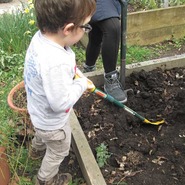with complex medical needs in nursery. Ruth Thomson explains.

Four-year-old Oscar Thomas is one of an increasing number of children entering nursery with complex medical needs. The rise stems largely from advances in modern medicine, resulting in increased survival rates of premature babies, more effective treatment of congenital and genetic conditions and better outcomes for children following severe illness or injury.
 In Oscar's case, he has a neurological condition that continues to baffle his doctors but affects both his physical and cognitive development and has other complications. For the past 18 months, he has attended Vanessa Nursery School and Cathnor Park Children's Centre in West London, where the team has looked after his medical needs and, as importantly, given priority to his social and emotional development.
In Oscar's case, he has a neurological condition that continues to baffle his doctors but affects both his physical and cognitive development and has other complications. For the past 18 months, he has attended Vanessa Nursery School and Cathnor Park Children's Centre in West London, where the team has looked after his medical needs and, as importantly, given priority to his social and emotional development.
Register now to continue reading
Thank you for visiting Nursery World and making use of our archive of more than 35,000 expert features, subject guides, case studies and policy updates. Why not register today and enjoy the following great benefits:
What's included
-
Free access to 4 subscriber-only articles per month
-
Unlimited access to news and opinion
-
Email newsletter providing activity ideas, best practice and breaking news
Already have an account? Sign in here









